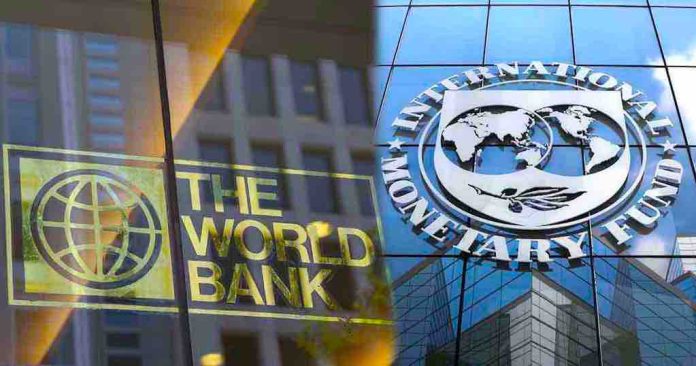African economies are dealing with increasing budgetary strains as a result of a difficult external environment characterized by trade tensions, inflationary pressures, and growing debt loads, while global GDP is predicted to decline to its worst rate since 2008.
The World Bank is pushing Nigeria to step up efforts to diversify its economy and fortify regional trade alliances in the face of a global economic slowdown brought on by rising trade tensions and policy uncertainties.
Because of Nigeria’s significant reliance on oil exports and susceptibility to changes in global markets, economic diversification and more African integration are essential to maintaining growth and boosting resilience in the face of growing worldwide
The World Bank’s most recent Global Economic Prospects report emphasizes that, barring outright recessions, sustained global trade tensions and policy uncertainty are predicted to cause global growth to decline to its lowest level since 2008. Nearly 70% of economies, including Nigeria and most of Africa, are expected to see slower growth as a result of this downturn.
In 2025, global growth is predicted to slow to 2.3%, which is almost 0.5 percentage points less than previous projections.
The average growth rate in the 2020s is expected to be the slowest since the 1960s, even though a global recession is not predicted.
Nonetheless, it stated that a worldwide recession is not anticipated. However, the bank predicted that the first seven years of the 2020s will see the slowest average global growth since the 1960s if predictions for the next two years come to pass.
These international dynamics present serious difficulties for Nigeria. Because of the combined effects of falling oil prices, rising import prices, and capital flow issues amid increased global uncertainty, the International Monetary Fund (IMF) lowered Nigeria’s growth prediction to 3% in 2025 and 2.7% in 2026. Nigeria is especially susceptible to fluctuations in the price of commodities worldwide due to its reliance on the export of crude oil, which accounts for more than 70% of its export revenue.
“The developing world outside of Asia is evolving into a region devoid of development. remarked Indermit Gill, Senior Vice President for Development Economics and Chief Economist for the World Bank Group.
“” It has over ten years of self-promotion. Over the course of three decades, the growth rate in developing countries has decreased, from 6% per year in the 2000s to 5% in the 2010s to less than 4% in the 2020s.
That reflects the decline in global trade growth, which dropped from an average of 5% in the 2000s to roughly 4.5% in the 2010s and less than 3% in the 2020s. While debt has increased to all-time highs, investment growth has also halted.
It is anticipated that growth will decelerate in almost 60% of developing economies this year, averaging 3.8 percent in 2025 before gradually increasing to an average of 3.9 percent in 2026 and 2027. That is over a percentage point below the 2010s average.
Low-income nations are predicted to expand 5.3% this year, which is 0.4 percentage points less than what was predicted at the beginning of 2025. In addition, tight labor markets and tariffs are driving up global inflation, which is still higher than it was before the epidemic and is expected to average 2.9% in 2025.
When growth slows, developing nations will find it more difficult to create jobs, alleviate extreme poverty, and catch up to established economies in terms of per capita income. It is anticipated that developing economies’ per capita income growth would be 2.9% in 2025, which is 1.1 percentage points less than the average for the years 2000–2019.
According to the analysis, it will take developing economies other than China almost 20 years to reach their pre-pandemic economic output trajectory assuming they can maintain an overall GDP growth rate of 4%, which is the figure predicted for 2027.
According to the Bretton Woods institution, if major economies can resolve trade issues, financial volatility and overall policy uncertainty will decrease, allowing global growth to recover more quickly than anticipated. According to the report, global GDP would be on average 0.2 percentage points stronger in 2025 and 2026 if the trade disputes of today were settled with accords that cut tariffs in half from their levels in late May.
According to Ayhan Kose, director of the Prospects Group and deputy chief economist at the World Bank, “developing and emerging-market economies have benefited from trade integration but are now at the forefront of a global trade war.”
The best course of action is to intensify integration efforts with new partners, promote pro-growth measures, and strengthen fiscal resilience to withstand the storm. In the paper, Kose said, “A more stable and prosperous future can be mapped out through renewed global dialogue and cooperation as trade barriers rise and uncertainty increases.”
The paper makes the case that developing nations should aim for further trade liberalization in the face of growing trade obstacles by diversifying their trade, especially through regional accords, and pursuing strategic trade and investment alliances with other nations. Policymakers should prioritize fiscal spending for the most disadvantaged households, mobilize domestic income, and reinforce fiscal frameworks in light of the government’s limited resources and growing development demands.
Read Also: The Dance of Politics in Enone Federal Constituency: An Ode to Rep. Philip Agbese!
In order to accelerate economic growth, the World Bank stated that nations must enhance business environments and encourage productive employment by providing individuals with the skills they need and establishing the framework for labor markets that effectively connect workers and businesses.
In order to assist the most vulnerable emerging economies, international cooperation will be essential. This cooperation will include multilateral interventions, concessional funding, and emergency assistance and support for nations involved in ongoing wars.
Nigeria’s own 27 percent tariff on American goods exacerbates trade tensions, which include the US imposing a 14 percent duty on Nigerian exports, which threatens to lower export demand and foreign cash inflows. These reciprocal duties run the danger of raising import prices for Nigerians, depreciating the value of the Naira, and upsetting vital supply lines for the country’s economy.
The World Bank cautions that these trade disputes and the uncertainties they cause will probably limit Nigeria’s fiscal flexibility and make it more difficult to finance infrastructure and social initiatives. Nigeria and other African countries are at further risk due to the slowdown in global trade growth, which went from 5% in the 2000s to less than 3% in the 2020s, as well as growing debt levels.
Experts advise Nigeria to increase economic diversification by strengthening its own value chains and industrial capabilities in order to address these challenges and lessen its reliance on outside demand. To counteract global concerns, smart commercial alliances inside Africa and the strengthening of regional trade integration could be beneficial.
Moreover, maintaining growth and job creation depends on strengthening the business environment, increasing labor market efficiency, and mobilizing domestic revenues. To support Nigeria and other vulnerable African economies during this time of increased economic uncertainty, international cooperation and concessional finance will be crucial.
Join Television Nigerian Whatsapp Now
Join Television Nigerian Facebook Now
Join Television Nigerian Twitter Now
Join Television Nigerian YouTUbe Now





